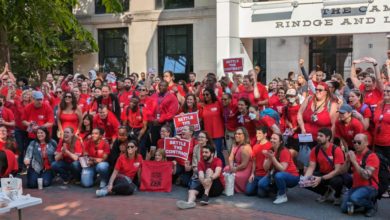The showdown in Congress over the fate of social programs that would provide desperately-needed relief to working class people has entered a critical phase. The proposed social spending budget, worth $3.5 trillion, is under fierce attack from Republicans and right-wing Democrats. People’s movements will have to apply strong pressure in order to force the passage of these urgent reforms.
The budget is set to be passed using a process called budget reconciliation. Budget reconciliation is being used by Democrats to bypass the filibuster, an internal Senate rule that requires 60 votes for bills to pass. Using budget reconciliation, the Democrats only need 51 votes to pass the budget in the Senate. With Vice-President Kamala Harris as the tie-breaker in the event of a 50-50 vote, that means that the vital social programs under consideration could be passed without a single Republican vote
The real roadblock is therefore members of the Democratic Party itself. Democratic senators Joe Manchin and Kyrsten Sinema have emerged as the main figures trying to slow down and ultimately halt the passage of the budget.
There are methods available to Democratic leaders that could discipline Manchin and Sinema, including primary challenges, a promise of zero campaign money from the Democratic National Committee, “no” votes on any of their sponsored legislation, and expulsion from committee assignments. An independent peoples’ movement is needed to provide the pressure that the Democratic Party leadership is too weak-willed to generate.
In fact, not only has the Democratic Party elite failed to bring its own members into line, it has also completely failed to adequately communicate to the public the importance of passing this social program budget. The measures contained within it are widely popular and address core concerns of the working class.
Measures to benefit the working class
In the initial framework released by the Senate last month that formally began the budgeting process, education initiatives feature prominently. $726 billion is set to be allocated to the Health, Education, Labor and Pensions Committee to be used to enact free universal pre-Kindergarten, free community college, increased funding for historically Black colleges and universities, and an expansion of Pell grants. $35 billion is set aside for developing child nutrition programs at school to guarantee millions of additional children receive free meals.
Hundreds of billions of dollars would be allocated for environmental initiatives including programs to reduce forest fires, fight drought, and develop green energy sources. Green energy funding from the budget would aim to reduce carbon emissions by 50% and upgrade infrastructure to ensure that 80% of the power grid runs on “emissions free” sources by 2030.
Families in poverty will receive major assistance. $332 billion is set to be invested in housing programs including improvements to public housing and expanding grants for low and very low income families to buy homes. In a major boon for poor families, a temporary tax credit will be made permanent that would result in households receiving a $300 check per month per child under the age of six and $250 monthly check for children over six.
Health is another key priority in the planned budget. All workers will receive guaranteed sick leave. Workers would also finally be guaranteed the right to family leave, something that exists in nearly every developed country but shamefully not the United States. Negotiations are ongoing to decide whether Medicare coverage should be expanded to include free vision, hearing, and dental insurance or whether instead Medicaid should be expanded to include states whose governments opted out of the Medicaid expansion in the Affordable Care Act. Instead of an either/or consideration, both should be fully funded and expanded.
Big pharma greed vs. Medicare
One of the predictable responses from Republicans, so-called “moderate” Democrats, and the corporate owned media is, “how is the government going to pay for this?” It’s important to note that while this objection is always raised against programs which benefit the working class, the same fiscal concerns are never raised against the war budget which amounts to approximately $1 trillion dollars annually — money that goes not to the poor but to fabulously wealthy arms industry corporations.
But nevertheless, the social program budget does answer this question with tax increases on the wealthy and corporations. Another way it would generate revenue is by decreasing Medicare expenditures by lowering the cost of prescription drug prices. In 2020 prices for prescription drugs rose twice as fast as the rate of inflation. Medicare recipients currently spend on average $650 of their own money annually on prescription drugs. All of this goes to line the pockets of pharmaceutical industry capitalists.
To address this situation, the budget would create rules that instruct Medicare to negotiate drug prices with pharmaceutical companies. Under the plan, drug prices would be capped at 120% of what other industrialized countries pay for the same drugs. Non-compliant companies would be hit by a severe tax increase. This plan would not only improve the quality of care for Medicare recipients but would also free up $450 billion that would instead be spent expanding Medicare and/or Medicaid.
Lobbyists for the pharmaceutical industry are trying hard to make sure their personal cash cow isn’t butchered. The amount of money the pharmaceutical industry has spent on lobbying in 2021 so far stands at $171 million, following an all-time high of $309 million in 2020. This system of legalized bribery, where large corporations buy the loyalty of politicians, is paying dividends. Democratic Representative Scott Peters, who received the most money from big pharma in preparation for the 2022 election cycle, is leading the charge against Medicare drug price reductions.
Peters, Manchin, Sinema and their allies have proven themselves in dramatic fashion to be sworn enemies of the working class. They are willing to go to great lengths to cruelly deny the poor a life with dignity and protect the vast fortunes of the rich at all costs. But just like any enemy of the workers, they can be defeated in struggle.






